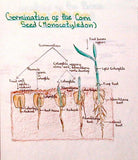Library Lady's Corner
The Poetic Meaning of End of Year Reports in Waldorf Schools May 16 2023
Children, students, everywhere strive for excellence. All children who have not been traumatized by extraordinary experiences or abused by adults one way or another, want to learn, to be smart, to understand this large and confusing world into which they have been born. Some children hide this yearning. If they find out early that those delivering education, in whatever form, have decided they are not excellent, or have not met invisible expectations, they might become seemingly insouciant, uncaring, indifferent to what is happening in a learning environment. Some children crumble and dissolve into confusion, striking out at whatever they can identify that might be “right.”Three Timelines in the Education of a Youngster: Three Opportunities for Misunderstanding April 28 2016
Let us think peace and use the understanding of dissimilar timelines to weave collaboration and solutions instead of additional strife in an unsettled and unsettling world. Our children will thrive if we do.Book Review: Solving the Riddle of the Child: the Art of the Child Study by Christof Wiechert January 25 2016
The very essence of Waldorf education lives in the Child Study. Observing the children is primary task of every Waldorf teacher. The entire curriculum should be formed out of this child observation practice and new organs of perception are developed from this practice. This is why Rudolf Steiner was so insistent about administration being done by those who are with the children every day, not by others who have nothing directly to do with teaching the children. The real revolution lives in this open secret of Waldorf education: that the observation of children is the heart of the curriculum… Read More...The End of Year Report in Waldorf Schools May 30 2015

Assessment is a “hot topic” in the news and in educational debate. In Waldorf schools assessment takes many forms, none of which includes standardized testing.
During the year, concentrated “blocks” of study might include an end-of-block assessment. A block might be three or four weeks long and concentrate study on one topic. After a botany block in the fifth grade an outdoor “treasure” hunt to find, for example, a monocotyledon, a pistil, a tap root, a deciduous conifer branch, a dicotyledon, and so on, might be the "test.” After a block on physiology in grade seven, an essay entitled, “The Diary of a Sandwich,” might be the means of assessment..... READ MORE
